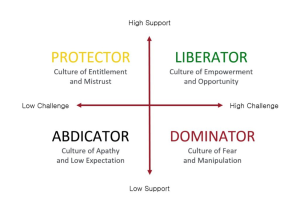Paul Sohn is an award-winning blogger, speaker, and author. This blog post is reposted with permission. It was originally posted on May 27, 2016 on his website blog, Quarter Life Calling found at www.paulsohn.org. Paul’s vision is to empower leaders to rise to the top of every sphere of influence. Paul worked at both a Fortune 50 company and a Great Place to Work Company. He now works as a leadership transformation consultant at GiANT Worldwide. He has been ranked as the #15 of world’s top 50 leadership bloggers to follow. Christianity Today magazine named Paul as one of the Top 33 Under 33 Christian Millennials to Watch.
Tip: Draw this visual tool on a piece of napkin and you can immediately ignite a powerful conversation, assessing one’s leadership effectiveness practically with anyone and anywhere.
Forget servant leadership, transformational leadership, transactional leadership, and situational leadership. All had its heyday. In the 21st century, a new style of leadership is emerging that will be a gamer changer: LIBERATING LEADERSHIP
A liberator is someone who fights for the highest possible good in the lives of those they lead.
Who Is A Liberator?
Liberators have an uncanny ability to calibrate high support and high challenge. They continually reassess and recalibrate themselves in the five circles of influence, starting from self and extending into family, team, organization, and community. They are secure, confident, and smart leaders who operate with humility for the best of the greater good not for their personal gains. At GiANT Worldwide, we call liberators leaders worth following.
To liberate means you must first be liberated. It means you need to break down your walls of self-preservation that might be hindering you to be released. Vladimir Putin is not a liberator, though he uses that language in Russia and Ukraine. In fact, he is a Dominator. ISIS is a Dominating movement using fear and power to control and dominate people to pursue their ideologies.
The fact is that none of us are natural liberators. None of us naturally create a culture of empowerment and opportunity for those we lead. By default, we tend to either become protectors, dominators, or abdicators. Becoming a liberator is an intentional process.
Are You A Protector? Dominator? Abdicator?
Ask yourself these questions: Do you find it easy to bring high support? In other words, is it easy for you to praise others and encourage others? Expressing empathy and sympathy might come naturally to you. However, you might struggle saying “no” when someone makes a request or asks for help. Or you might not wrestle with how to best assert your ideas and sometimes tell people the unvarnished truth. You might fear conflict as it may disrupt the harmony you long for. If you find yourself nodding as you read this, you might have a tendency of a Protector. Left without intentional improvement, a Protector creates a culture of entitlement and mistrust. Entitlement, because over time everyone on the team begins to assume that that’s the new normal, that they’re not going to be challenged, that they’re not going to be stretched, that you’re going to stay and do the extra work rather than asking them to do.
On the other hand, you might have no problem bringing high challenge. You don’t fear speaking up, as “truth” is more important to you than simply pleasing the other person. You might have tendencies to micro-manage since you have important deadlines to meet. You’re not afraid to share your constructive feedback with others. The difficult aspect might be how you provide challenge. Do you often blurt out your thoughts so directly that it may cause deep offense to your followers? If you resonate with these tendencies you might be a Dominator. Left alone, Dominators create a culture of fear and manipulation. They fear the anger because you haven’t delivered the results that you said you’re going to do. You’re often only as good as the last quarter’s numbers. That culture really starts to hinder and undermine those you lead.
And the last quadrant is where you have leaders that don’t bring support or challenge and we call that the Abdicator. Leaders in this area create a culture of apathy and a low expectation.
This is an essential tool for leaders who really want to have influence in the lives of those they lead. Learning how to calibrate support and challenge in an appropriate way and all have areas of growth. None of us are naturally good at both. Now, go be intentional and work on yourself to be liberated. We need a tribe of global liberators.

